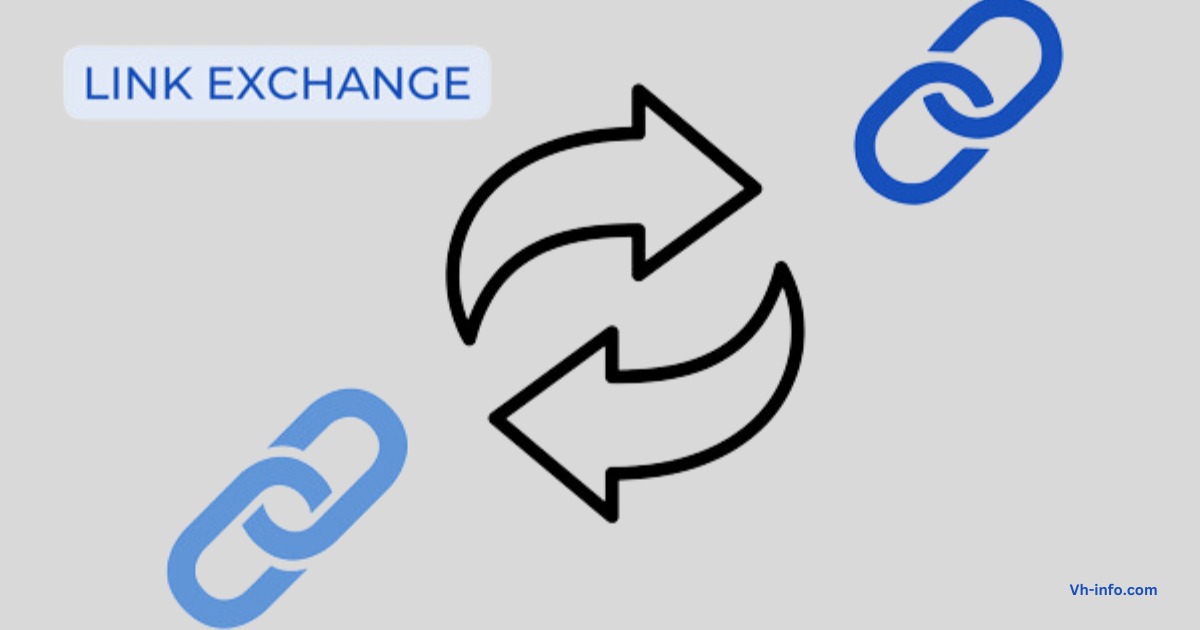Link exchanges have been a popular strategy for boosting SEO.
In this blog, we’ll explore how they work and their legitimacy. Link exchanges involve websites linking to each other to increase trust and authority.
Quality matters more than quantity in backlinks. Partner with relevant and trusted sites for effective link exchanges.
When done right, link exchanges can benefit SEO. Let’s see it in more detail now!
What is a Link Exchange?
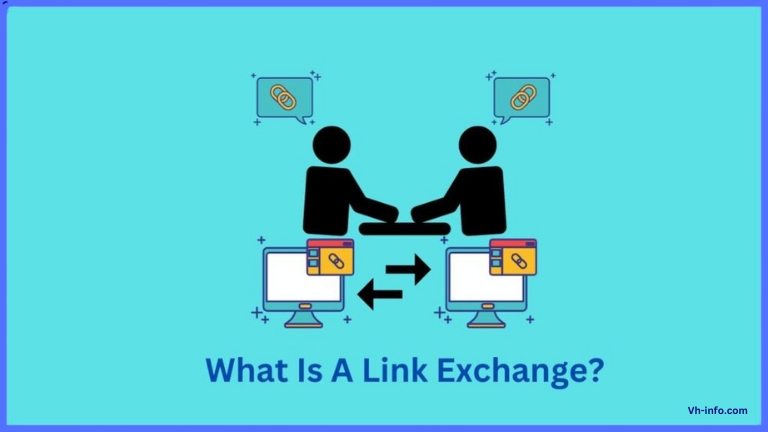
A link exchange also called a link swap or reciprocal linking, is when two or more websites agree to link to each other. This builds trust and authority with search engines. When a site links to another, it shows confidence and tells search engines the linked site is reliable and important. This can boost its ranking in search results and get more visibility. Exchanging links is part of SEO.
Getting good backlinks from trusted sites helps a site rank higher in searches and attract more visitors. But, do it carefully with relevant sites to avoid penalties from search engines. These backlinks, or “link juice,” greatly affect a site’s SEO and growth.
How Do Link Exchanges Work?

Link exchanges work by website owners contacting each other through various channels like email or social media.
Once contact is established, they agree to exchange links in different ways:
- 2-Way Link Exchange: One site links to the other, and vice versa, creating a mutual linking arrangement.
- 3-Way Link Exchange: Involves a third party where each site links to a different site in a triangular linking pattern.
- Guest Post Swap: Bloggers agree to write posts for each other’s sites, including links back to their own pages.
These practices aim to boost a site’s ranking by gaining backlinks, but they come with varying degrees of safety and effectiveness.
Why Would Someone Want to Exchange Links?
Exchanging links is valuable because it builds trust and authority online, which is crucial for SEO (Search Engine Optimization). Websites that rank well on Google attract more visitors, leads, and revenue. However, the online competition is intense, with numerous websites vying for top positions. Link exchanges offer a shortcut to gaining backlinks and improving SEO standing, making them a popular strategy for businesses looking to grow and monetize quickly in a competitive digital landscape.
Is Exchanging Links a Legitimate Strategy?

Link exchanges used to be a legitimate strategy in the early days of the internet to improve a website’s search engine rankings. However, search engines like Google have become much smarter and stricter over time. These days, link exchanges are generally seen as an attempt to manipulate search results unfairly.
While an occasional reciprocal link between relevant, high-quality sites is fine, large-scale link exchanges are now considered a black hat SEO tactic that puts your website at a high risk of violating Google’s spam policies.
Instead of link exchanges, it’s better to focus on creating great content that earns high-quality, editorial links naturally from other reputable websites in your niche. You can learn more about unnatural links and how to identify and remove them.
Are Link Exchanges Good For SEO?
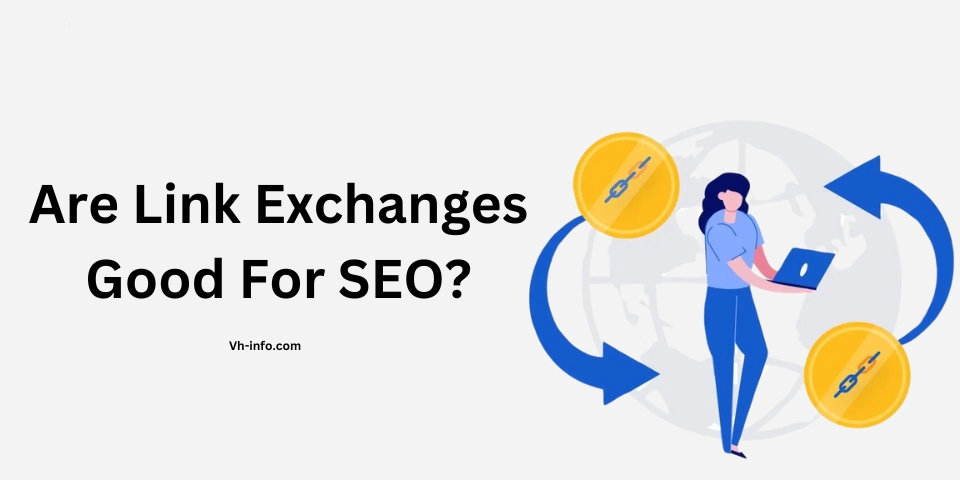
Link exchanges are generally not recommended for SEO anymore. Search engines can easily identify exchanged links and tend to devalue or ignore them. Instead of link exchanges, it’s better to focus on creating high-quality content that naturally earns backlinks from other authoritative sites in your industry.
Building a strong backlink profile through white hat link building tactics is more effective for improving search rankings in the long run.
Are Link Exchanges Safe?
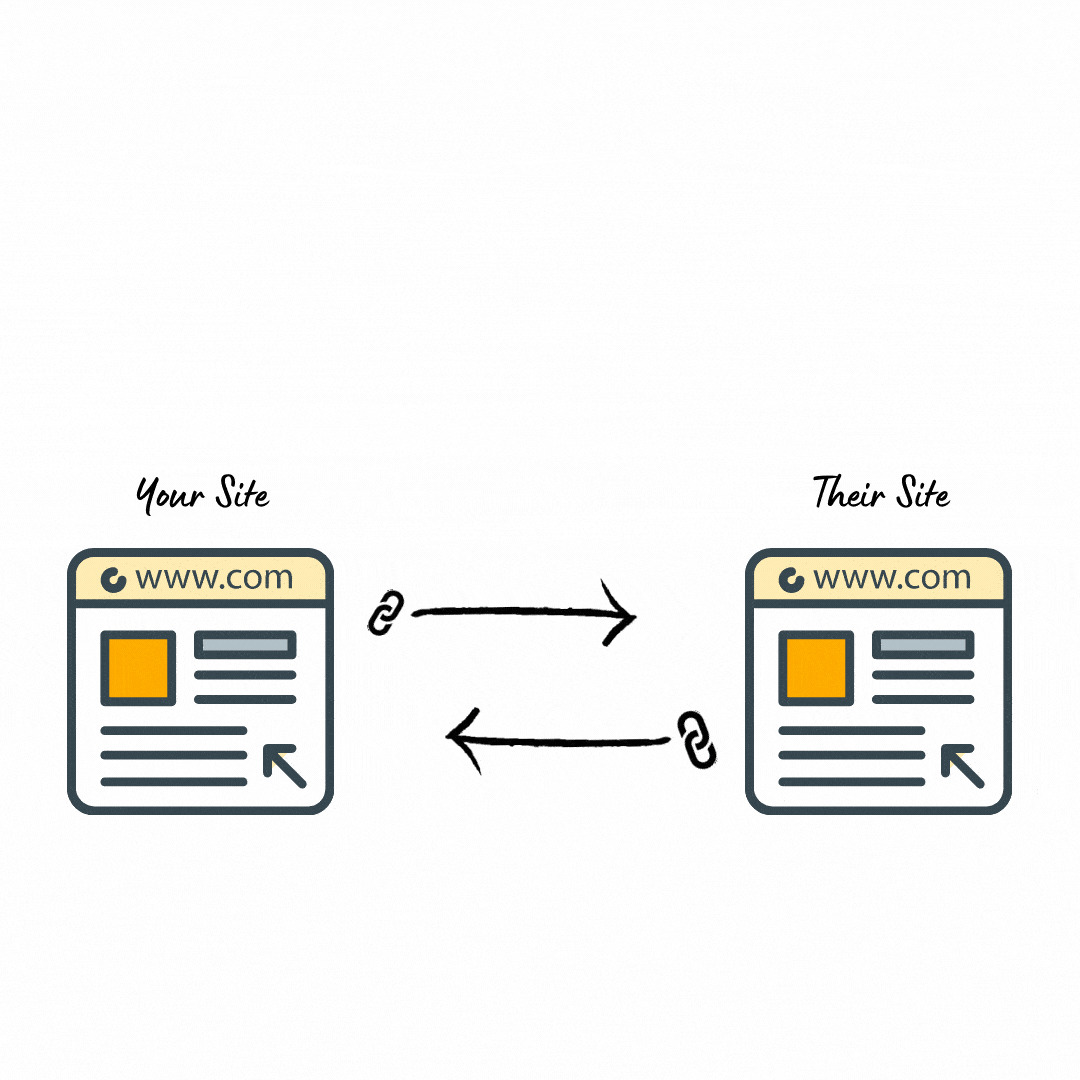
Link exchanges can be safe in moderation.
Risks exist, so follow guidelines to prevent penalties from search engines. Google’s rules state excessive exchanges or cross-linking are violations and spam.
If done manipulatively, it’s seen as a scheme leading to penalties. Exchange links cautiously to avoid issues with Google.
Swapping links is safe moderately with quality sites. Avoid mass link exchanges or low-quality sites to prevent penalties affecting your SEO rankings. Focus on natural backlink building by creating and promoting great content instead.
Link Exchange SEO Benefits
Here are some potential SEO benefits of link exchanges:
- Increase in backlinks – Link exchanges can help build more backlinks pointing to your site, which is a ranking factor for search engines.
- Referral traffic – Well-chosen link exchanges with relevant sites can drive targeted visitors to your website.
- Initial link building – Link exchanges can help kickstart your backlink profile when your site is brand new.
- Potential anchor text leverage – You may be able to control the anchor text of exchanged links to some degree.
- Reciprocal linking still carries some weight – While not as valuable as one-way editorial links, reciprocal links from moderated exchanges still signal relevance to search engines.
Disadvantages of Link Exchange
While link exchanges can provide several benefits, there are also some disadvantages to consider.
- Search engine penalties – Search engines like Google can easily identify large-scale link exchange schemes and may penalize sites participating in them as an attempt to manipulate rankings unfairly.
- Irrelevant links – Many link exchanges happen between unrelated sites simply to trade links, which provides little to no value to users.
- Low-quality links – Link exchanges often involve links from low-quality, spammy sites which can actually harm your site’s reputation and rankings.
- Time and effort required – Maintaining a large network of active link exchange partners requires significant ongoing time and effort.
- Devaluation over time – As search engine algorithms get smarter, they are putting less and less weight on reciprocal links exchanged for SEO purposes versus natural editorial links.
The Importance of Link Exchange for SaaS Businesses

Link exchanges can be particularly important for SaaS (Software as a Service) businesses.
For SaaS companies, Vh-info understands the unique challenges and opportunities in the industry. Their link exchange strategies are designed to boost brand visibility, drive referral traffic, and establish valuable industry connections for long-term growth.
Here are a few points on the importance of link exchanges for SaaS (Software as a Service) businesses:
- Referral Traffic – Link exchanges with other relevant SaaS companies or websites in complementary industries can drive targeted traffic to your platform from audiences that may be interested in your service.
- Brand Exposure – Getting your SaaS brand listed and linked on authoritative industry sites through exchanges can increase brand visibility and recognition.
- Initial Link Building – When launching a new SaaS product, link exchanges can help kickstart your backlink portfolio before you’ve had a chance to earn many editorial links.
- Relationships – Exchanging links allows you to build relationships with other businesses that may lead to partnership opportunities, cross-promotions, or other collaborative efforts down the line.
- Competitive Advantage – If your SaaS competitors are actively doing link exchanges, participating as well prevents them from outranking you solely based on this tactic.
What to Look At When Considering a Link Exchange?
When considering a link exchange, it’s important to carefully evaluate potential partners and consider several factors.
- When you want to do a link exchange, it’s vital to pick partners carefully and think about some things. First, see if the partner’s website is related to yours. Find sites in the same field to make sure both benefit.
- Next, check if the partner’s site is good quality. Choose reputable sites with great content and many good links.
- Lastly, be smart about it. Don’t exchange links with bad sites that use tricky tactics or spammy methods.
Link Exchanges for Referral Traffic & Brand Building
When you think about growing your business, the right link exchange can be really valuable, even if it’s not just for improving your SEO.
For instance, getting a link from a sponsored post or guest post on a relevant website can give you a good return on your investment of time or money. So, before you agree to a link exchange, think about how it can help your business.
For example, if you have a dog grooming business in Nashville and a local vet asks to swap links with you, it makes sense because you’re both in the same area with similar audiences. It’s like leaving your flyer at their office and vice versa. This kind of link exchange can benefit your business beyond just SEO.
SEO Link Exchange
SEO link exchanges mean exchanging links for better search rankings. By getting good links from trusted sites, SEO swaps enhance a site’s ranking. These links show search engines your site is trustworthy and important, boosting visibility and rankings.
When swapping links, focus on relevant partners in your field. Relevance affects backlink value and effectiveness. Partnering with niche-related sites ensures valuable, relevant backlinks for your visitors, crucial for better SEO and relevance in searches.
Where To Find Link Exchanges?

Finding websites for link exchanges can be easy. You can contact sites directly to suggest a link swap. Reach out via email or social media. Another way is to use link exchange networks that match website owners. These platforms have lists of sites open to exchanges, simplifying the search.
Also, engage in forums related to your field to meet potential partners. Look into private groups where members trade links. Guest posts and content sharing help find industry-relevant link buddies too. Join online groups like Slack or Facebook for connecting with similar websites.
Create a network of influencers for swapping links or recommendations. LinkedIn is useful for reaching out to content specialists regarding linking possibilities. Always make sure both sides benefit from the link exchange and offer value to your audience.
Types of Link Exchanges
There are four main types of link exchanges that people use to get more links to their websites.
Even though these strategies are different, they all help websites become more trustworthy, relevant, or authoritative. However, some of these methods carry more risks than others.
One-Way Links
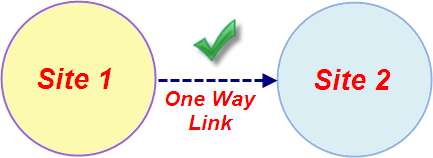
One-way links are links from one website to another without getting a link back. They’re valuable. You can get them through guest posting. When you contribute good content to other sites, you can include a link to your site. This gives you a backlink.
Anchor text is the clickable text of a link. It should describe the linked page well. Relevant anchor text helps SEO.
Getting one-way links is good for SEO and backlinks. Creating quality content and relationships is key. Owners benefit from them.
Reciprocal Links
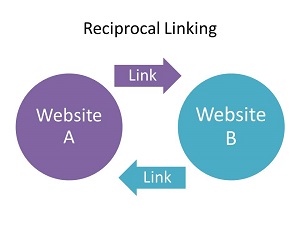
Reciprocal links, or link exchanges, happen when two websites agree to link to each other. This helps get quality backlinks and boost search rankings. Exchanging links with good sites increases visibility and authority for both. But too many reciprocal links can break Google’s rules. Follow guidelines for natural and relevant link exchanges. Check if the partner site’s outbound links are high-quality too to enhance SEO value.
Three-Way Link Exchanges (ABC Linking)
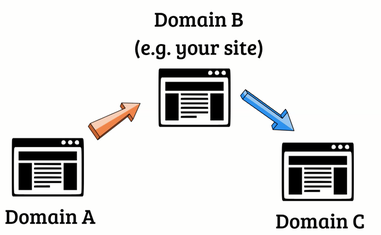
Three-way link exchanges, also called ABC Linking, involve three websites linking to each other in a triangle. Each site links to another, creating a backlink network. This method can help get backlinks naturally, avoiding direct reciprocal links.
Such exchanges diversify backlinks and boost SEO. Getting backlinks from relevant sites enhances visibility and authority with search engines. However, excess three-way exchanges can be penalized as a scheme, so follow guidelines for natural linking.
Private Influencer Networks (PIN)
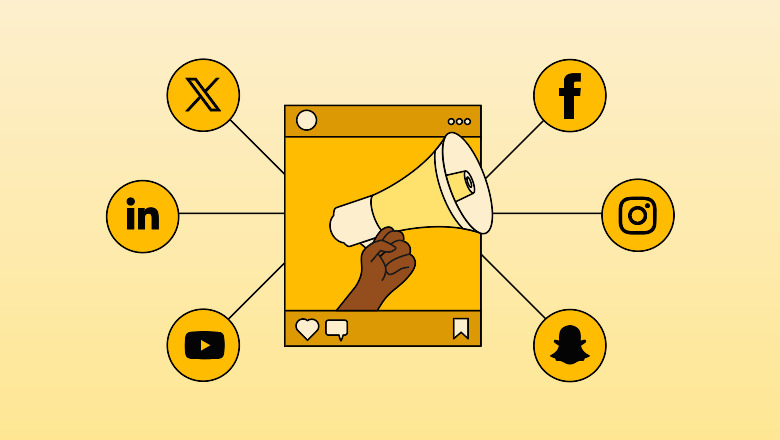
Private Influencer Networks (PIN) are a type of link exchange. It involves partnering with influencers or industry leaders to get backlinks from their websites. By connecting with influencers, you can use their reputation to get quality backlinks. This helps boost brand visibility and attract more visitors naturally.
PINs are a good way to get backlinks from important sites. Partnering with influencers who are popular online can help you reach a wider audience. However, it’s crucial to be honest and ethical in these partnerships. Building real connections and offering value through your content is key for successful collaborations that benefit everyone.
How to Implement Link Exchange in SaaS Businesses?
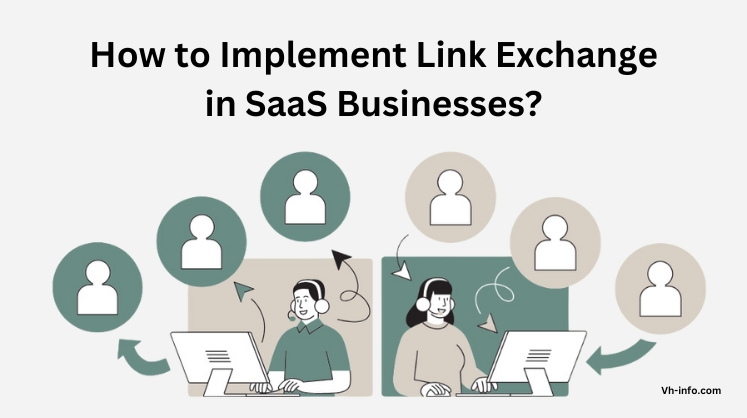
Implementing link exchanges in SaaS (Software as a Service) businesses can be a valuable strategy for increasing online visibility and improving search engine rankings.
Vh-info offers comprehensive guidance and execution for SaaS companies looking to implement effective link exchange strategies. Our team follows a structured approach, ensuring relevance, quality, and adherence to best practices.
Here are the steps to implement link exchange in SaaS businesses:
- Identify Potential Partners: Look for SaaS businesses that complement your offerings without competing directly.
- Reach Out: Craft personalized emails explaining the mutual benefits of the link exchange.
- Ensure Relevance: Make sure the content surrounding the exchanged link is relevant to add value for users.
- Track Performance: Monitor metrics like referral traffic to gauge the success of the link exchange.
How to Perform a Link Exchange: Best Practices
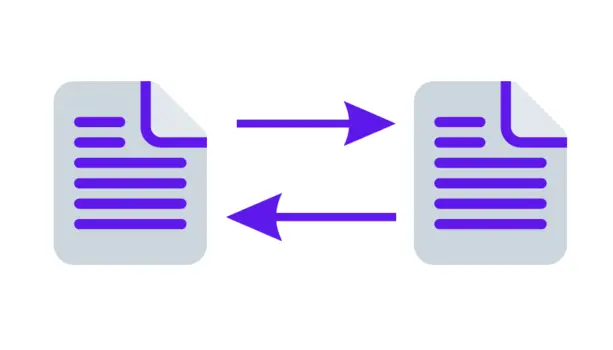
Before reaching out to potential link exchange partners, evaluate the quality of your own content. Ask yourself if it’s valuable enough for others to link to.
Also, check if your website looks professional and authoritative. Self-assessment is crucial before starting link exchanges to build a healthy backlink profile.
To ensure successful link exchanges, make sure your content matches or exceeds the quality of your potential partners’.
This way, your content can be as beneficial to their readers as their links are to yours. Once you’ve done this self-assessment, you can follow these steps for safe and effective link exchanges.
Find Relevant Websites/Link Exchange Partners
SEO involves both competition and collaboration. Identify competitors with higher domain authority and potential partners whose content relates closely to yours. Use Google’s related operator for this, but manual searching may be needed if your site is low-ranking. Analyze their content quality, backlink strategies, and SEO tactics to create a shortlist of potential partners and competitors for link outreach.
Perform Link Exchange Outreach
You can usually find a website’s contact information on its About/About Us page, which often includes email addresses, phone numbers, or a contact form. However, manually searching each page can be tiresome. Tools like Uplead can help you gather all contact details efficiently.
Craft a Personalized Approach to Outreach for Link Exchange
When reaching out for link exchanges, your approach is crucial. Be professional and respectful while highlighting mutual benefits. Avoid using generic templates; personalize each message based on your potential partner’s writing style. Email is often the best outreach method as it allows you to track success rates.
Hire Someone Else to Do It
If managing link exchanges feels overwhelming, consider hiring a specialized agency to do it for you. They already have relationships with high-authority sites, saving you time and effort. These agencies offer more than just backlink exchanges, often providing full SEO services like content analysis and ongoing performance tracking.
Placing Your Link Exchanges
After securing a link exchange, it’s important to integrate the links naturally into your content. Avoid using naked URLs unless it fits naturally. Anchor text is a better choice, but vary it using secondary keywords or key information from the linked content. Place links within the body of your content for a more organic feel and to avoid triggering Google’s spam detection.
How Many Backlinks Should There Be on a Page?
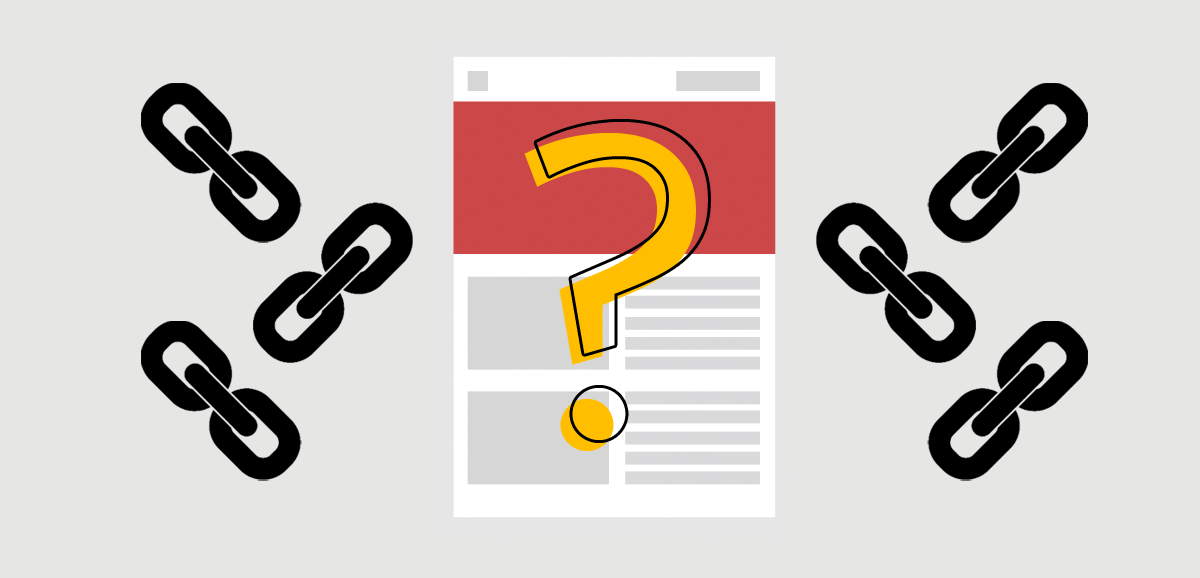
The number of backlinks on a page isn’t strictly limited by Google’s guidelines anymore.
While older advice suggested fewer than 100 links per page, Google has since removed this suggestion. Quality matters more than quantity; it’s better to have one high-quality backlink than many low-quality ones.
For readability and user experience, it’s still good to limit outbound links to 3-4 per piece of long-form content. Avoiding excessive links helps maintain reader focus and improves website usability, especially for screen reader users.
Tools to Analyze Potential Link Exchanges

There are several tools available to analyze potential link exchanges and evaluate the quality of websites. These tools can help you make informed decisions when considering link exchange partnerships.
At Vh-info, they leverage industry-leading tools like Ahrefs, SEMrush, and Moz to thoroughly analyze potential link exchange partners, ensuring their clients receive maximum value from every partnership.
Here are some tools to consider for analyzing potential link exchanges:
Ahrefs
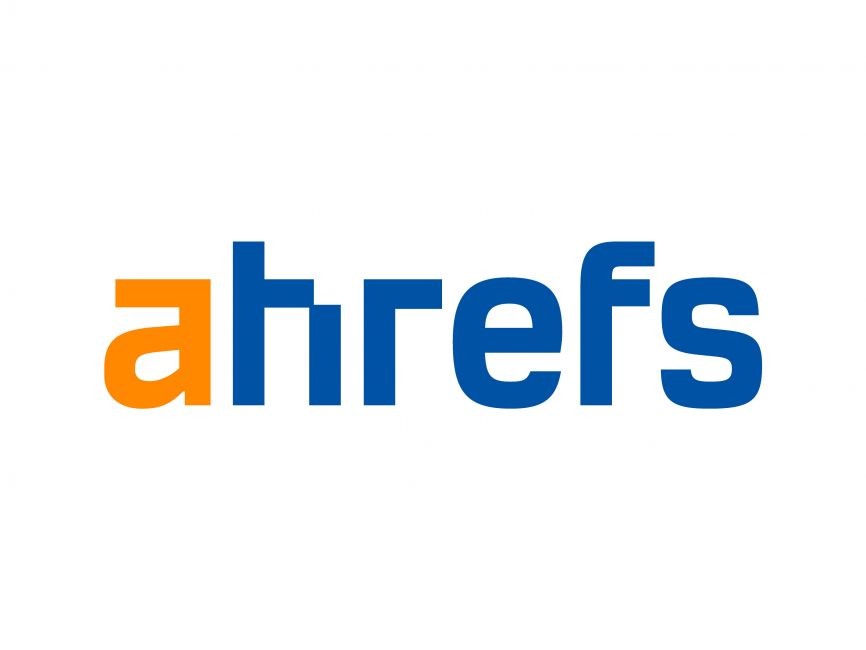
Ahrefs helps analyze backlinks and monitor your site’s backlink profile. It shows linking websites, backlink quality, and SEO impact.
The tool gives details on domain authority, anchor text in backlinks, and overall backlink profile health.
By studying this data, you spot bad backlinks affecting SEO. Ahrefs lets you compare with competitors for insights.
It’s useful for managing and enhancing your website’s backlink profile and SEO ranking.
SEMrush BAcklink Audit

Semrush Backlink Audit helps check your website’s backlinks. It finds harmful links affecting SEO. The tool analyzes backlinks, showing numbers, domains, and anchor text. It rates backlinks as toxic to help removal decisions.
Regular audits with Semrush ensure quality backlinks for better SEO. It also reveals competitor backlinks for link building ideas.
Moz Domain Authority Checker
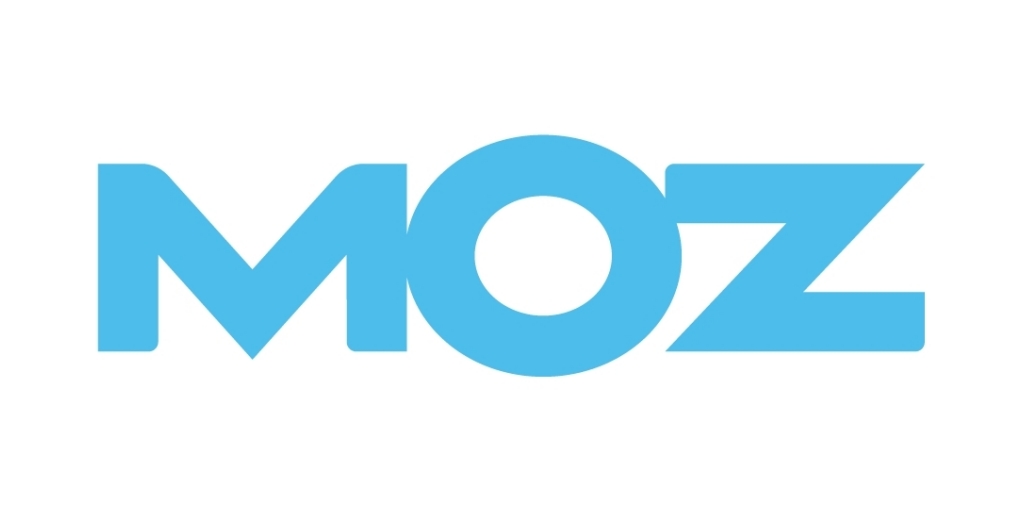
The tool, Moz Domain Authority Checker, helps you measure your website’s authority and credibility. It predicts rankings on search engines by considering backlinks, content relevance, and trustworthiness.
You can assess your website’s domain authority quickly and compare it with competitors using this tool. A higher score means a stronger site that ranks better on search engines.
To boost your site’s visibility and attract more visitors, work on enhancing domain authority through link building and SEO tactics.
FAQ’s:
Are Excessive Link Exchanges Risky?
Yes, excessive link exchanges can be risky as they may lead to a disproportionate link profile and raise red flags to search engines. It’s important to diversify your link building strategies and include other tactics like guest posting to maintain a natural and healthy link profile. Each tactic offers different benefits, so using a variety of methods can be the best way to achieve long-term success in your SEO ranking.
Are Link Exchanges Legal?
Link exchanges are legal as long as they adhere to search engine guidelines. However, excessive or manipulative link exchanges can lead to penalties. It’s important to engage in authentic and relevant link exchanges for SEO benefits without violating regulations.
Is it Better to Exchange Links than Ask for Reciprocal Links?
Yes, a 3-way link exchange is often better than a reciprocal link because it avoids creating a direct link between the same two websites, making it look more natural to search engines. This strategy helps prevent footprints and can be a more effective approach to link building.
What Should Be Included In Link Exchange Requests?
In a link exchange request, include reasons for the swap like mutual benefit from quality backlinks, explain how your link is useful to their readers, and offer ideas for where you could place backlinks for them, showing your understanding of their site’s value.
What Types of Sites Should I Exchange Links With?
When choosing sites for link exchanges, prioritize quality and use common sense to avoid Google penalties. Look for reputable sites with good SEO, relevant outbound links, and rankings for related keywords. Consider influencer networks cautiously, balancing the potential for high-traffic links with the risks. If unsure about link exchanges, explore other effective link building tactics or seek professional help from a link building agency.
Conclusion
In SEO, strategic link exchanges are essential for enhancing website visibility and credibility. By exchanging links with relevant sites, you can boost SEO rankings, drive referral traffic, and establish a strong online presence.
It’s crucial to follow Google’s guidelines and align exchanges with your business goals. For expert link building services, partner with VH-info Best Link Building Services. Their knowledgeable team ensures that every link exchange enhances your SEO success sustainably. Quality backlinks matter more than quantity for lasting SEO results.
